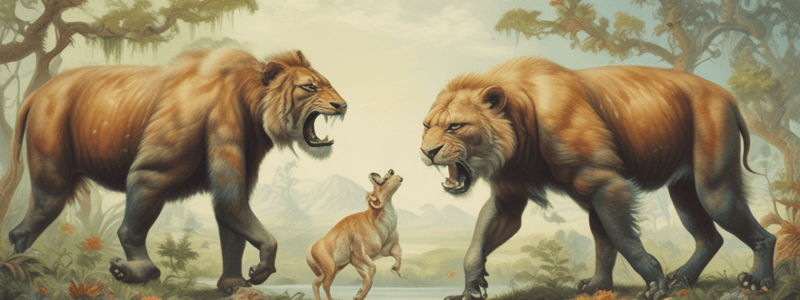Podcast
Questions and Answers
What is a consequence of genetic variation?
What is a consequence of genetic variation?
- No change in fitness and adaptation to environment
- Increased fitness and adaptation to environment (correct)
- Only leads to disease and disorder susceptibility
- Decreased fitness and adaptation to environment
What is the primary function of the mitochondria in a cell?
What is the primary function of the mitochondria in a cell?
- Cellular respiration (correct)
- DNA replication
- Protein synthesis
- Cell signaling
What is an example of passive transport in cells?
What is an example of passive transport in cells?
- Synthesis of new molecules
- Breakdown of molecules
- Active transport of molecules
- Diffusion of molecules from high to low concentration (correct)
What is the mechanism of speciation that occurs when a population is geographically isolated?
What is the mechanism of speciation that occurs when a population is geographically isolated?
What is genetic drift?
What is genetic drift?
What is the term for changes in chromosome number or structure?
What is the term for changes in chromosome number or structure?
What is the organelle involved in protein synthesis and transport?
What is the organelle involved in protein synthesis and transport?
What is evidence for speciation?
What is evidence for speciation?
Flashcards are hidden until you start studying
Study Notes
Genetic Variation
- Sources of Genetic Variation:
- Mutation: changes in DNA sequence
- Genetic recombination: crossing over and independent assortment during meiosis
- Gene flow: movement of genes between populations
- Genetic drift: random changes in allele frequency
- Types of Genetic Variation:
- Cytogenic variation: changes in chromosome number or structure
- Molecular variation: changes in DNA sequence
- Consequences of Genetic Variation:
- Increased fitness and adaptation to environment
- Evolution of new species
- Disease and disorder susceptibility
Cell Biology
- Cell Structure:
- Plasma membrane: semi-permeable membrane separating cell from environment
- Cytoplasm: jelly-like substance inside cell membrane
- Nucleus: contains genetic material (DNA)
- Mitochondria: site of cellular respiration
- Endoplasmic reticulum (ER): involved in protein synthesis and transport
- Ribosomes: site of protein synthesis
- Cellular Transport:
- Passive transport: movement of molecules from high to low concentration
- Diffusion
- Osmosis
- Active transport: movement of molecules from low to high concentration
- Requires energy input
- Passive transport: movement of molecules from high to low concentration
Speciation
- Definition: process by which a new species emerges from an existing one
- Mechanisms of Speciation:
- Geographic isolation: physical barrier separating populations
- Reproductive isolation: inability of populations to interbreed
- Ecological isolation: adaptations to different environments
- Types of Speciation:
- Allopatric speciation: speciation due to geographic isolation
- Sympatric speciation: speciation within same geographic area
- Evidence for Speciation:
- Morphological differences: distinct physical characteristics
- Reproductive barriers: inability to produce fertile offspring
Genetic Variation
- Mutation: changes in DNA sequence, resulting in new alleles
- Genetic recombination: crossing over and independent assortment during meiosis, increasing genetic diversity
- Gene flow: movement of genes between populations, altering allele frequency
- Genetic drift: random changes in allele frequency, leading to loss or fixation of alleles
- Cytogenic variation: changes in chromosome number or structure, affecting gene expression
- Molecular variation: changes in DNA sequence, altering gene function
- Consequences of genetic variation: increased fitness and adaptation to environment, evolution of new species, and disease and disorder susceptibility
Cell Biology
- Plasma membrane: semi-permeable membrane separating cell from environment, regulating material transport
- Cytoplasm: jelly-like substance inside cell membrane, providing mechanical support and medium for metabolic reactions
- Nucleus: contains genetic material (DNA), regulating gene expression and cell growth
- Mitochondria: site of cellular respiration, generating energy for cell
- Endoplasmic reticulum (ER): involved in protein synthesis, transport, and modification
- Ribosomes: site of protein synthesis, translating mRNA into polypeptides
- Passive transport: movement of molecules from high to low concentration, including diffusion and osmosis
- Active transport: movement of molecules from low to high concentration, requiring energy input
Speciation
- Definition: process by which a new species emerges from an existing one, resulting in reproductive isolation
- Geographic isolation: physical barrier separating populations, leading to allopatric speciation
- Reproductive isolation: inability of populations to interbreed, due to genetic or behavioral differences
- Ecological isolation: adaptations to different environments, reducing gene flow
- Allopatric speciation: speciation due to geographic isolation, resulting in distinct species
- Sympatric speciation: speciation within same geographic area, often due to ecological isolation
- Evidence for speciation: morphological differences, reproductive barriers, and genetic differences
Studying That Suits You
Use AI to generate personalized quizzes and flashcards to suit your learning preferences.




